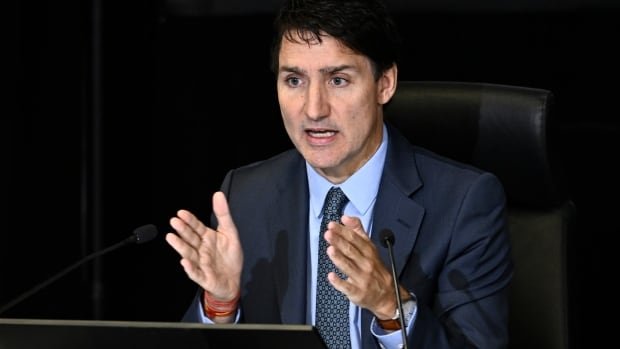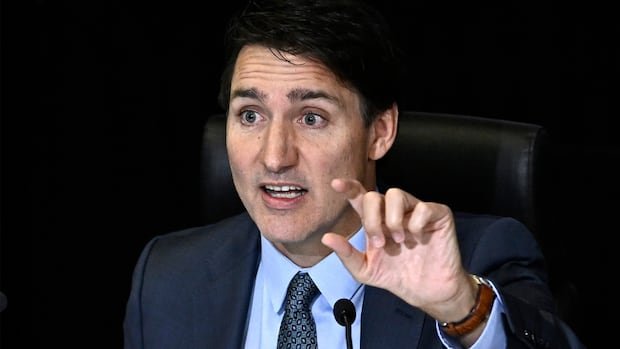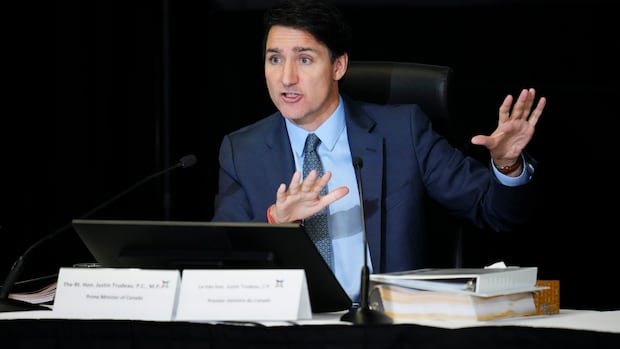Prime Minister Justin Trudeau testified at the public inquiry into foreign interference on Wednesday, describing what he says he knew about foreign attempts to meddle in Canadian politics and what led to his explosive claim in the House of Commons that India was behind the killing of Hardeep Singh Nijjar in June 2023.
His testimony spanned several hours and happened only days after the RCMP said Indian government agents were involved in crimes in Canada. Those allegations prompted both countries to expel six diplomats each and created a deeper rift in the diplomatic relationship.
Here are five key takeaways from Trudeau’s testimony:
PM puts focus on Conservatives
Trudeau said that he has the names of Conservative parliamentarians who are involved in foreign interference — a claim that prompted a sharp rebuke from the Conservative Party.
The prime minister also said that he instructed the Canadian Security Intelligence Service (CSIS) to warn Conservative Leader Pierre Poilievre in order to protect the party’s integrity.
“I have the names of a number of parliamentarians, former parliamentarians and/or candidates in the Conservative Party of Canada who are engaged, or at high risk of, or for whom there is clear intelligence around foreign interference,” he said.
Testifying at the Public Inquiry into Foreign Interference, Prime Minister Justin Trudeau attacked Conservative Leader Pierre Poilievre over his refusal to get the security clearance required to be briefed. Trudeau also said he has the names of Conservative parliamentarians involved in foreign interference and offered more details about India’s alleged involvement in targeting Canadians.
When questioned by Conservative Party lawyer Nando De Luca, Trudeau also said the names of Liberal parliamentarians and individuals from other parties are on the list of parliamentarians at risk of being compromised by foreign interference.
The term “parliamentarian” can refer to senators or members of the House of Commons.
Poilievre has so far resisted going through the security clearance process that the federal government has offered to him — a security clearance that would permit the Conservative leader to view the intelligence Trudeau referred to in his testimony.
Conservatives have said that clearance would prevent Poilievre from questioning or challenging the government on the issue of foreign interference.
Poilievre’s decision, Trudeau testified, means that “nobody in his party, not him, nobody in a position of power knows the names of these individuals and can take appropriate action.”
In a media statement, Poilievre called on Trudeau to “release the names of all MPs that have collaborated with foreign interference.”
“But he won’t. Because Justin Trudeau is doing what he always does: he is lying.”
Poilievre also wrote that he was briefed by top officials on Oct. 14 about “the matter of foreign interference from India” and his chief of staff has received classified briefings.
“At no time has the government told me or my Chief of Staff of any current or former Conservative parliamentarian or candidate knowingly participating in foreign interference,” he said in the media statement.
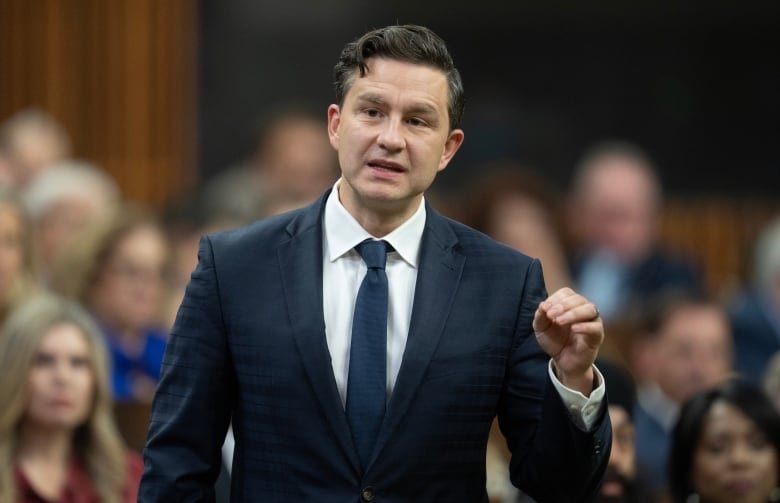
South Asian MPs helped prompt look into Nijjar killing
Trudeau told the inquiry that while the initial assessment of the killing of Sikh activist Hardeep Singh Nijjar was that it was “gang-related or criminal-related,” South Asian MPs and members of that community suggested the government of India was involved.
Nijjar, a key organizer for an overseas referendum on an independent Sikh state in India, was gunned down in the parking lot of a temple of Surrey, B.C. in June last year.
“There was not an obvious, immediate, international nexus to this,” Trudeau told the inquiry. “And that’s how we were briefed after the killing in the days after.”

But after hearing directly from South Asian MPs and members of the community who were “quite insistent” the killing was likely connected to India, Trudeau said he reached out to intelligence agencies to investigate.
“And it turned out they were doing this anyway to look in more closely to the circumstances of this particular murder,” Trudeau added.
Trudeau says he confronted Modi during summit
The prime minister testified that his government decided not to make the allegations over Nijjar’s death public before India hosted the G20 last September.
“We had the opportunity of making it a very uncomfortable summit for India if we went forward with these allegations ahead of time. We chose not to. We chose to continue to work behind the scenes to try to get India to cooperate with us,” Trudeau said.
“Their ask of us was, ‘How much do you know? Give us the evidence you have on this.’ Our response was, ‘Well, this is within your security agencies. You should be looking at how much they know.'”
Prime Minister Justin Trudeau says he spoke to Indian Prime Minister Narendra Modi about the death of Canadian Sikh activist Hardeep Singh Nijjar.
Trudeau said the back-and-forth came to a head during a conversation he had with Indian Prime Minister Narendra Modi at the summit.
“I sat down and shared that we knew that they were involved and expressed a real concern around it. [Modi] responded with the usual response from him, which is that we have people who are outspoken against the Indian government in Canada that he would like to see arrested,” he said.
Trudeau made the allegations public in the House of Commons after he returned from the G20 last year.
Trudeau says he learned of Chong allegation through media
During his testimony, Trudeau said that he first learned that the government of China allegedly was targeting Conservative MP Michael Chong through the media.
“My instant reaction was to turn to my [national security intelligence adviser] officials and say, ‘Find out what exactly the threat is, and if it is indeed this, why am I only learning about this in the newspapers?'” Trudeau said.
According to documents submitted to the inquiry, Trudeau said during an in-camera hearing that he had inferred from media headlines that China had chosen to go after Chong’s family to put pressure on the Conservative MP.

Trudeau also said during his in-camera testimony that his inference was not shared by professional intelligence analysts.
Trudeau said his comments were not meant to minimize the “real issue” — that China is singling out Parliamentarians for criticizing the actions of the Chinese government.
“But the stories that circulated around this, that they were going around Michael Chong’s family, are simply not borne out by the actual intelligence or analysis by intelligence officials,” he said.
Canada asked China to remove diplomat
Trudeau told the inquiry that Canada asked the government of China to remove Zhao Wei — a Chinese diplomat accused of targeting Chong’s family — before deciding to declare Zhao “persona non grata” and kicking him out of the country.
Zhao reportedly played a role in attempts to gather information on Chong’s family in Hong Kong in 2021 following the MP’s condemnation of Beijing’s conduct in the Xinjiang region.
Trudeau said there was an exchange of messages with Chinese officials before Zhao was ejected. He testified that he previously told Chinese officials that China needed to stop interfering in Canada’s democracy.
“Despite that and many other messages to China, the interference continued and even in some cases increased,” Trudeau said.
When Zhao’s alleged activities became public, Trudeau said, it meant he “was not going to be able to operate as a regular diplomat in Canada anymore.”
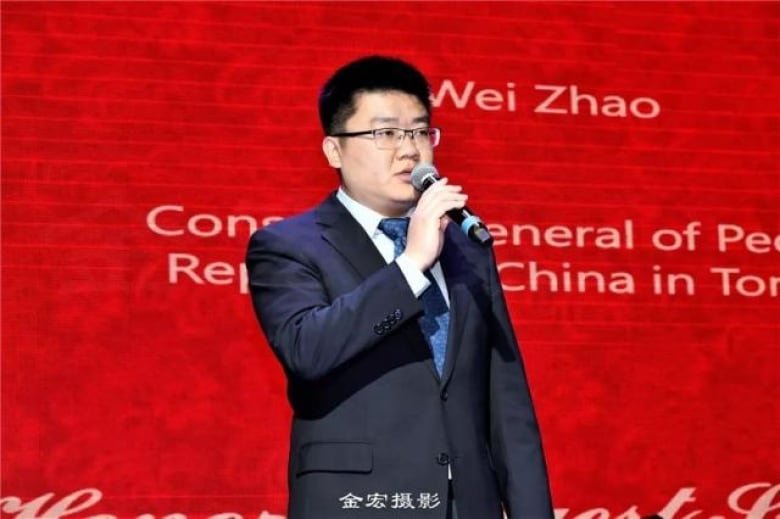
Trudeau also said he doesn’t have to approve the decision to eject a diplomat, since that authority is with the foreign affairs minister, but he is at least “engaged” in the deliberations.
“Kicking out a diplomat is a big thing, not a small thing. And it is right and proper that the authority be at the foreign minister level,” Trudeau said. “But it is something that as prime minister I am very much kept in the loop on.”
The inquiry will hold a final set of hearings from Oct. 21-25 to hear from experts on policies the commission should include in its recommendations.
